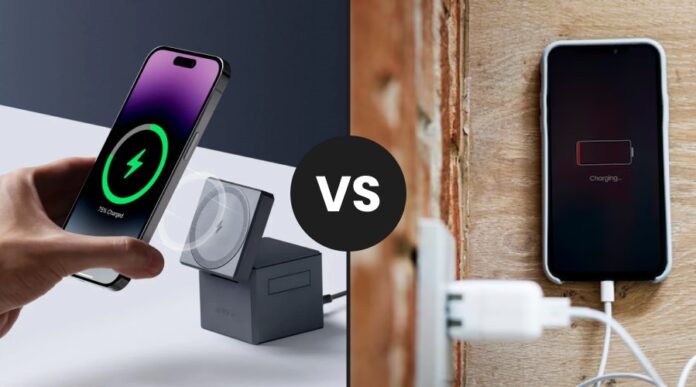There is no clear-cut answer on which one is better, wired or wireless charging, your choice depends on your specifics. Wireless charging is gaining more approval because of its simplicity and ease of use while wired charging has always been the pick of charge because of the fast and effective power delivery as they are compatible with almost all devices. Times have changed and now instead of struggling with the wires, the customer can simply place their phone on a charging pad.
Which charger is more appropriate for a given circumstance depends on several criteria, including charging speed, battery health, convenience, and energy efficiency. In this article, learn about the main features that help distinguish the two charging systems from one another, and this comparison will help you choose the better charger.
Wireless Charging vs Wired Charging: A Comparison
To determine which type of charging technology holds supremacy in the quest for the ultimate charging experience, let’s have a comparison of key features:
| Feature | Wireless Charging | Wired Charging |
| Convenience | Simple to use and clutter-free of cables | Cables are needed, and it can get messy. |
| Speed | Slower in general, particularly for rapid charging. | Increased charging rates, particularly with the use of fast charging methods. |
| Efficiency | During the charging process loses energy, which reduces its efficiency. | Reduced energy loss and increased efficiency. |
| Device Placement | It is necessary to align the charging pad precisely. | No specific alignment required. |
| Compatibility | Limited to devices with wireless charging capabilities. | Compatible with most devices with a charging port. |
| Cost | Higher initial cost for both chargers and devices. | Lower initial cost. |
| Durability | Reduced damage to the charging port of the device | Potential wear and tear on the charging port and cable |
| Aesthetics | Sleek and modern design | More traditional look |
Wireless Charging vs Wired: Key Differences
The preference for one charger type over the other depends on personal preference as well as the actual application of the device in use. Here are some of the key differences:
1. Charging Speed


2. Convenience and Portability


3. Battery Health and Heat


4. Energy Efficiency


5. Device Compatibility


Also Read: What is Reverse Wireless Charging And How to Use?
6. Durability


Choosing a Charger: Factors to Consider
Choosing the proper charger for the gadget can lead to a difference in the actual charging rate, safety, and health of batteries. Here are essential factors to consider when choosing a charger:
- Compatibility: Make sure that the charger is ideal for the charging port of your device, it could be a USB C, Apple, or Micro B among others. Also, some devices have some unique charging features so using an incompatible charger may not provide optimal performance.
- Wattage and Charging Speed: Chargers and their cables with an increased wattage allow for the fastest possible charging when you use fast-charging compatible devices. For instance, charging a compatible phone or tablet with a 30W will charge it faster than when it is charged using a 10W charger.
- Quality and Safety Certifications: For safety and environmental standards, check for symbols UL, CE, or FCC markings, which mean that a device has been tested safe. Quality charges incorporate security features against overheating, over-voltage, and short-circuiting, ensuring safer charging.
- Charging Technology: Many gadgets are compatible with certain fast charging standards including Qualcomm QC, USB-PD, or proprietary systems like Apple’s fast charging. This means that one needs to select a charger that supports the kind of technology that his/her device uses in a bid to get the best results in concern of charging speed.
- Port Options: Multi-port chargers are perfect if you intend to charge a couple of electronic items in one go. Chargers should have ports such as USB-C or USB-A, depending on the devices that you possess.
- Portability and Design: For travelling the chargers should be small and lightweight than the conventional chargers. Some models use foldable prongs that make it easy to carry them along.
- Cable Quality and Length: It is crucial to have a sturdy, high-quality cable that facilitates rapid charging. The cable’s length is also crucial, longer cables provide greater flexibility, but shorter cables are typically more effective.
Conclusion
In conclusion, consider speed, convenience, protection for devices, and energy requirements when selecting a charger. The wired charging is faster and more reliable in comparison with the wireless charging. Wireless charging has the feature of a stationary and comfortable charging requirement without necessarily using the port several times. Ultimately, many customers feel that both are helpful, wireless for convenience when speed isn’t an issue, and wired for rapid, effective charging.

